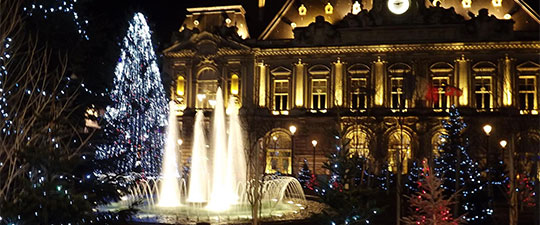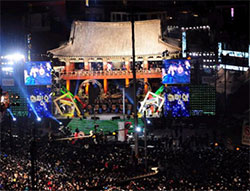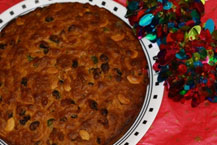Celebrating Diversity: Winter Holiday Traditions of International MBA Students

Tis' the season for rekindling all of those winter holiday traditions that we hold. While we get ready to partake in our own traditions by shopping for gifts, booking travel plans, and preparing meals, it is important to recognize the holiday traditions of those from different cultures than our own. Bowling Green State University proudly celebrates its diversity within its student body and embraces the cultural differences that students bring to the table. In the MBA program, students from nine different countries are represented, and with that comes many unique and interesting cultures and holiday traditions. Here are stories from four of the international students.
 In Nigeria, Yohane Iyorkar and his family celebrate Christmas and New Year’s much like many American families do. The Christmas day festivities begin for his family at church where they celebrate the birth of Jesus. From there, the family eats lunch together at their home. However, this meal is not large as there is much eating yet to do throughout the day. After finishing lunch, the family heads out into the neighboring community to visit with other families and celebrate with them as well. All of the households they visit provide food for any visitors that stop through as a means of showing their appreciation for one another.
In Nigeria, Yohane Iyorkar and his family celebrate Christmas and New Year’s much like many American families do. The Christmas day festivities begin for his family at church where they celebrate the birth of Jesus. From there, the family eats lunch together at their home. However, this meal is not large as there is much eating yet to do throughout the day. After finishing lunch, the family heads out into the neighboring community to visit with other families and celebrate with them as well. All of the households they visit provide food for any visitors that stop through as a means of showing their appreciation for one another.
 Coming from South Korea, Jieun Song also celebrates Christmas and New Year’s during the winter months. However, the Christmas celebration in South Korea takes on a slightly different form than the traditions practiced in America. Instead of the holiday having a family-oriented feel, the Christmas holiday takes on an energized celebratory feeling. In America, most businesses are closed but in South Korea, all of the businesses are open and metropolitan areas are buzzing with activity. Jieun spends her time shopping and enjoying the company of friends over drinks on this day. Gift-giving on Christmas occurs between couples and from parents to small children (using the disguise of Santa Claus as is the custom in America). It is very rare that people purchase gifts for their parents or friends.
Coming from South Korea, Jieun Song also celebrates Christmas and New Year’s during the winter months. However, the Christmas celebration in South Korea takes on a slightly different form than the traditions practiced in America. Instead of the holiday having a family-oriented feel, the Christmas holiday takes on an energized celebratory feeling. In America, most businesses are closed but in South Korea, all of the businesses are open and metropolitan areas are buzzing with activity. Jieun spends her time shopping and enjoying the company of friends over drinks on this day. Gift-giving on Christmas occurs between couples and from parents to small children (using the disguise of Santa Claus as is the custom in America). It is very rare that people purchase gifts for their parents or friends.
 Jieun spends her New Year’s holiday at home watching the holiday festivities that occur at the Bosingak in Seoul, the capital city of South Korea. In the Korean tradition, officials wearing traditional Korean robes will ring a large bell 33 times at midnight to signify the changing of the year. The number 33 is a significant figure in the Buddhist religion that is practiced by many South Koreans. This event is attended by thousands of Korean citizens and watched by millions more on television, much like the Times Square celebration in the United States. Jeiun’s favorite part of the winter holiday season is the Christmas atmosphere, because it is such a cheerful time of the year.
Jieun spends her New Year’s holiday at home watching the holiday festivities that occur at the Bosingak in Seoul, the capital city of South Korea. In the Korean tradition, officials wearing traditional Korean robes will ring a large bell 33 times at midnight to signify the changing of the year. The number 33 is a significant figure in the Buddhist religion that is practiced by many South Koreans. This event is attended by thousands of Korean citizens and watched by millions more on television, much like the Times Square celebration in the United States. Jeiun’s favorite part of the winter holiday season is the Christmas atmosphere, because it is such a cheerful time of the year.
 Because there are no Hindu winter traditions, Sidharth Banerjee and his family take part in the Christmas tradition in his hometown of Kolkata, India. While their celebration does not hold the religious significance that Christmas holds for many Christian families, it has become a time for them to spend quality time with family and friends. His family always puts up a small tree to decorate and enjoys eating a variety of cakes on Christmas day. Plum cake is Sidharth’s favorite out of all the options. He mentioned that gift-giving is extremely rare on Christmas.
Because there are no Hindu winter traditions, Sidharth Banerjee and his family take part in the Christmas tradition in his hometown of Kolkata, India. While their celebration does not hold the religious significance that Christmas holds for many Christian families, it has become a time for them to spend quality time with family and friends. His family always puts up a small tree to decorate and enjoys eating a variety of cakes on Christmas day. Plum cake is Sidharth’s favorite out of all the options. He mentioned that gift-giving is extremely rare on Christmas.
 For New Year’s, Sidharth typically goes out with friends and celebrates the upcoming year over beverages. It is traditional in his culture that parents and children do not drink together. Therefore, his parents will head out and enjoy celebratory drinks with other people within their generation, while Sidharth and his friends do the same separately. He is most looking forward to this part of the holiday season, as he enjoys the time with his friends and the celebratory atmosphere of the occasion.
For New Year’s, Sidharth typically goes out with friends and celebrates the upcoming year over beverages. It is traditional in his culture that parents and children do not drink together. Therefore, his parents will head out and enjoy celebratory drinks with other people within their generation, while Sidharth and his friends do the same separately. He is most looking forward to this part of the holiday season, as he enjoys the time with his friends and the celebratory atmosphere of the occasion.
 Zhengyu Huang celebrates the Spring Festival back home in China. This holiday is comprised of many traditions. To prepare for the occasion, Zhengyu and her family clean everything in the house in a symbolic gesture to “clean away the bad luck” and decorate everything in red, which signifies happiness and good luck. On the eve of the Spring Festival, Zhengyu and her family embark on a four-hour drive to her grandparents’ house for a family reunion and feast. Approximately 15 family members attend yearly, and together, the family eats a large meal containing many specialties such as fish, chicken, duck, pork, and dumplings. The meals for the feast are prepared 10-15 days ahead of time by the members of the family. In another symbolic gesture, members of the family will not finish all of the food on their plate so as to “leave something behind” from the previous year.
Zhengyu Huang celebrates the Spring Festival back home in China. This holiday is comprised of many traditions. To prepare for the occasion, Zhengyu and her family clean everything in the house in a symbolic gesture to “clean away the bad luck” and decorate everything in red, which signifies happiness and good luck. On the eve of the Spring Festival, Zhengyu and her family embark on a four-hour drive to her grandparents’ house for a family reunion and feast. Approximately 15 family members attend yearly, and together, the family eats a large meal containing many specialties such as fish, chicken, duck, pork, and dumplings. The meals for the feast are prepared 10-15 days ahead of time by the members of the family. In another symbolic gesture, members of the family will not finish all of the food on their plate so as to “leave something behind” from the previous year.
 On the next day, the day of the Spring Festival, the whole family heads out to the neighborhood to wish the neighbors a "Happy New Year." Zhengyu and her cousins all receive money from their grandfather in a red envelope on this day, and they will also receive candy and money from the neighbors as they venture from house to house. On the day of the Spring Festival, all of Zhengyu’s family members will dress in new clothing to signify the fresh start of the new year. Her favorite part of the holiday season is the food and getting to spend time with her cousins while lighting off celebratory fireworks.
On the next day, the day of the Spring Festival, the whole family heads out to the neighborhood to wish the neighbors a "Happy New Year." Zhengyu and her cousins all receive money from their grandfather in a red envelope on this day, and they will also receive candy and money from the neighbors as they venture from house to house. On the day of the Spring Festival, all of Zhengyu’s family members will dress in new clothing to signify the fresh start of the new year. Her favorite part of the holiday season is the food and getting to spend time with her cousins while lighting off celebratory fireworks.
Yohane, Jieun, Sidharth, and Zhengyu are just four of the many students within the MBA cohort with unique and fascinating cultural traditions that take place over the winter months. In remembering and preparing for your own holiday traditions, don’t forget to think about those that are far from home and have different experiences than yourself.
Happy Holidays!
Updated: 05/13/2019 12:46PM
